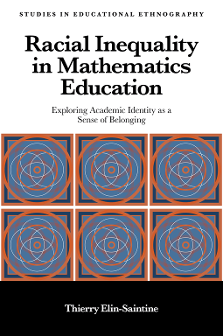
Index
Racial Inequality in Mathematics Education
ISBN: 978-1-78769-886-4, eISBN: 978-1-80043-990-0
ISSN: 1529-210X
Publication date: 26 August 2021
Citation
Elin-Saintine, T. (2021), "Index", Racial Inequality in Mathematics Education (Studies in Educational Ethnography, Vol. 15), Emerald Publishing Limited, Leeds, pp. 127-130. https://doi.org/10.1108/S1529-210X20210000015009
Publisher
:Emerald Publishing Limited
Copyright © 2021 Thierry Elin-Saintine. Published under exclusive licence by Emerald Publishing Limited